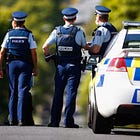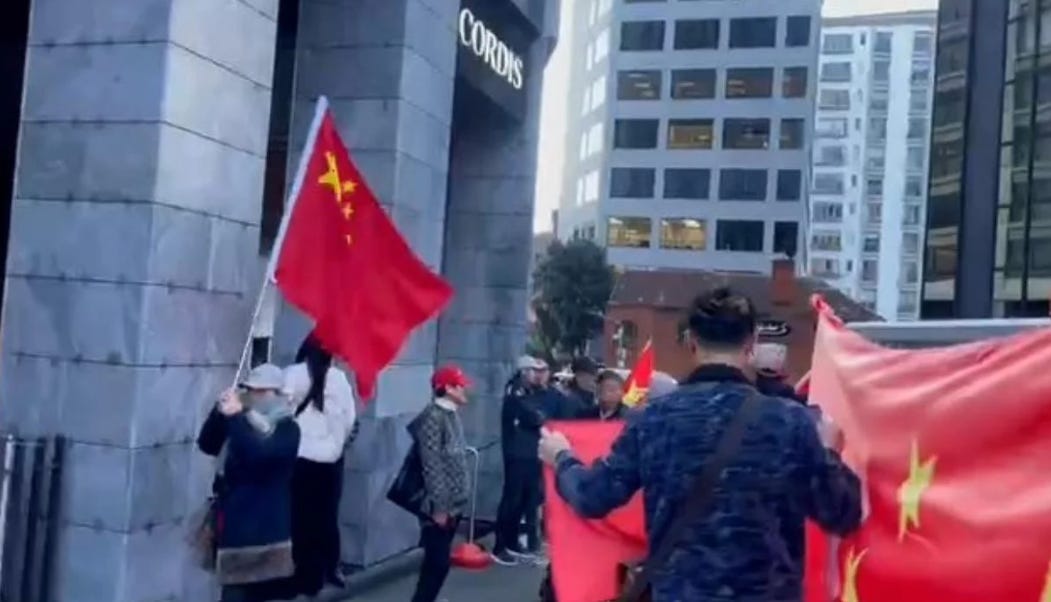Politically, pouring ‘cold water’ onto challenging issues in New Zealand is common place – be it the recent police scandal or instances of foreign interference. It's time to sustain conversations.
Have you noticed how cold water is quickly and figuratively poured over emerging political issues in New Zealand? The latest scandal around some senior police commanders is a good case in point as too the exposure of various instances of foreign interference over recent years.

There is often the initial pearl clutching, tut tutting, and press stand-ups with very serious expressions. Initial optics often imply the issues are being taken seriously, but often there is very little follow through. Sometimes there is simply ambiguous statements or words akin to mumbling.
Maybe it is just me, but we do not seem to be able to sustain attention on major issues. We get quickly excited or angry, and then soon forget. Part of this will be explained by simple human psychology as well as new stories entering our consciousness. But I also believe there is often a deliberateness to this; a strategy that pours cold water over issues to ensure they fade to the sidelines.
The current scandals surrounding some senior police commanders (mostly former) is a case in point. As the story broke, there were many strong words shared by Ministers, replete with disapproving and frustrated faces. Yet despite media continuing to report on the matter, there is now relative silence from those in political power. It’s a classic ‘cold water’ strategy of simply saying nothing; denying the story oxygen.

Policing the police
Simon O'Connor 13 Nov
Read full story
And yet there are many more questions that need to be asked. Arguably, we will only see justice and the cultural change needed in police by having continued attention. Instead, it appears a political desire to park up the issue and move on. This of course could be an unfair observation, and there is much work going on quietly in the background. But I am not convinced.
I might add, Andrew Coster should have been immediately fired from his role at the Social Investment Agency. Talk is cheap, but action is what New Zealanders expected. Whether sacking him outright is allowed by employment law or not is a point for debate. Such misconduct, confirmed by the Independent Police Conduct Authority (IPCA), needed a firmer response than merely words. If the law needs to be changed, well, that is what parliament is there for! And if he was to win an employment law complaint due to the failings of the current legislation, then that is a small price to pay for his political masters to have shown firm leadership.
Several of my Substack readers mentioned how this recent scandal has them questioning everything from the nearly three hours given to then Justice Minister Kiri Allan to sober up before completing an evidential breath test, to questioning how independent was the covid protest inquiry. I share here, as both situations also illustrate the cold water dynamic. Initial commentary, but then a relative wall of political silence.
Turning to foreign interference here in New Zealand, I was interviewing Nick Hanne from PILLAR NZ, with both of us noting how many examples have come to light and yet the usual political response is - well - cold water!
When Professor Anne Marie Brady, Louisa Wall, and my emails were specifically targeted by the Chinese Communist Party (CCP) several years ago, the New Zealand government knew, but said nothing. When the FBI let us know and we raised the issue publicly, there was brief hand wringing by political leaders and then the usual ‘cold water’ of saying nothing, nor following up, and the issue faded.
When we released the Safeguard Defenders report about the CCP operating at least two (and likely five) secret police stations in New Zealand, the government’s response was to deny and deflect. Cold water. Silence.
In 2022, through contacts we were able to share a leaked security agreement between China and the Solomon Islands as well as a manifest of riot gear and weapons being shipped to the Solomons. Despite being shared with the various New Zealand ‘powers that be’, there was little response by the government. Again, silence acts as cold water and the story - and seriousness of the issue - fades from view.
In more recent times, pro-democracy activists were attacked at a bus station in Wellington. As far as I am aware, the police have not investigated and no political figure has commented on the assault despite the activists involved having phone footage of the attack, and being relatively confident in identifying who was involved. Once again, cold water.

Still image of the protest by pro-democracy advocates in Auckland
We had a CCP naval taskforce traveling through the Tasman Sea at the start of this year, undertaking live fire exercises which disrupted commercial air traffic. Cue forty eight hours of theatrical outrage and then, you guessed it, cold water.
While in Parliament, I tabled in committee materials to the Ministry of Foreign Affairs and Trade (MFAT) showing how New Zealand’s UNWRA funding was being used to produce terrorist supporting text books to kids in Gaza and the West Bank. Denial. Silence. Cold water.
And finally, we have the sinking of the HMNZS Manawanui. You remember, that $100+ million dollar naval vessel that the crew ran aground on a coral reef in Samoa, caught fire, and sank. A sinking that saw a 1/6th of our naval fleet eliminated. Well, to date still, no one has been held to account. In this case, the cold water is not just figurative - but 98 feet of literal cold water.
Simon O'Connor a former National MP graduated from the University of Auckland with a Bachelor of Arts in Geography and Political Studies . Simon blogs at On Point - where this article was sourced.


3 comments:
But Why? Why does NZ respond with cold water?
Note: The government did this also to the Gluckman report on the universities.
Surely the answer is simple. A public service that protects its own, no matter their behaviour. A public service that considers the rest of us idiots that can be ignored as they know best.
Indeed CXH - the foxes guarding the hen house analogy comes to mind. The bureaucrat class remain immune despite their many and varied 'fox-ups', and will resort to 'nippiness' when seriously challenged.
Post a Comment
Thank you for joining the discussion. Breaking Views welcomes respectful contributions that enrich the debate. Please ensure your comments are not defamatory, derogatory or disruptive. We appreciate your cooperation.